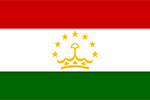
Population
9M+
CHRISTIAN PERSECUTION STATUS
high
Persecution
CHRISTIAN POPULATION
<1%
Status of
the church
The population of isolated Tajikistan is more than 90% Muslim. Most Muslims are Sunni, but the country is also home to Shia Muslims and other groups, including Bahai’s, Jews, and around 63,000 Christians (Open Doors).
Religious freedom in Tajikistan has declined sharply since a restrictive religion law was passed in 2009. The government prosecutes groups outside of its control. Some Protestant groups face potential legal action for their activities because they have been repeatedly denied official registration. Religious literature is also restricted.
Recent years have seen mounting criticism of Tajikistan’s human rights record. There is an ongoing government crackdown on freedom of expression, with access to certain websites blocked and the press restricted. Domestic violence against women is also a problem, and organizations cite inadequate protection for victims.
Ethnic Tajiks who convert from Islam may face pressure from family members to return to their traditional religion.
Internet use is highly restricted, authorities regularly blocking websites and social media platforms (Freedom House). Satellite television is virtually uncensorable and is widely used. SAT-7 PARS broadcasts into Tajikistan, offering both Farsi and Tajik programs.
Location
Prayer points
What our viewers are saying